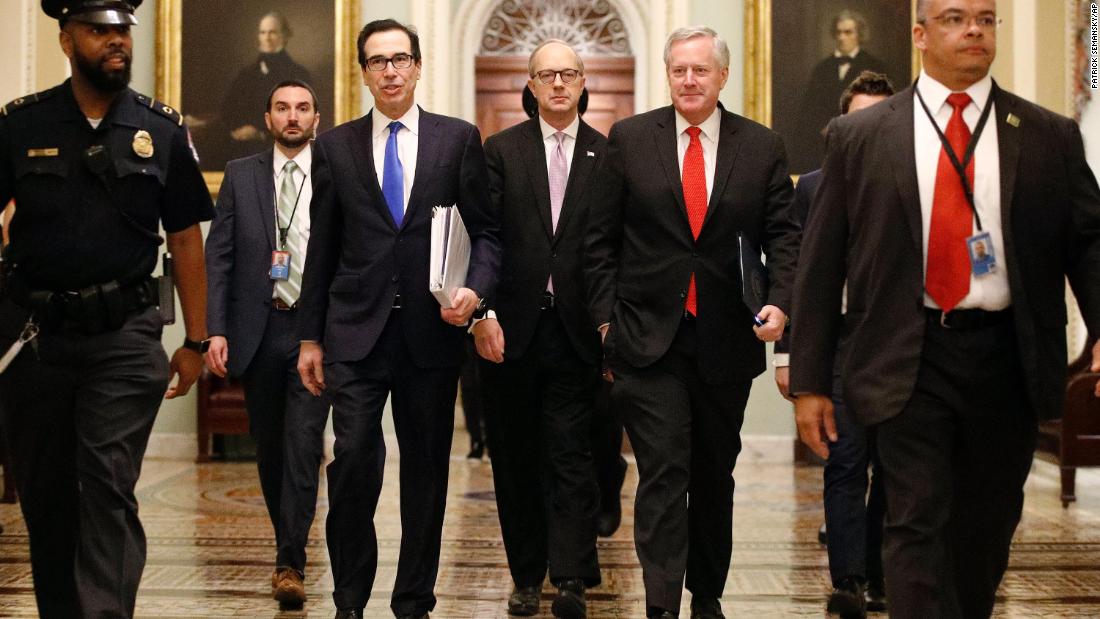[ad_1]

The full details have yet to be released. But over the last 24 hours, the elements of the proposal have come into sharper focus, with $250 billion set aside for direct payments to individuals and families, $350 billion in small business loans, $250 billion in unemployment insurance benefits and $500 billion in loans for distressed companies.
Senate Majority Leader Mitch McConnell formally announced the agreement on the Senate floor in the early hours of Wednesday morning, describing it as “a wartime level of investment for our nation,” and said that the Senate would move to pass it later in the day on Wednesday.
An exact time for the Senate vote has not yet been scheduled and it’s not yet clear when the House will vote to approve the measure.
The plan will deliver a massive infusion of financial aid into a struggling economy hard hit by job loss, with provisions to help impacted American workers and families as well as small businesses and major industries including airlines.
Under the plan as it was being negotiated, individuals who earn $75,000 in adjusted gross income or less would get direct payments of $1,200 each, with married couples earning up to $150,000 receiving $2,400 — and an additional $500 per each child. The payment would scale down by income, phasing out entirely at $99,000 for singles and $198,000 for couples without children.
Stimulus hits last-minute snag
Republican Sens. Lindsey Graham and Tim Scott of South Carolina, Rick Scott of Florida and Ben Sasse of Nebraska are now pushing for a vote on an amendment to the stimulus package in a move that creates some uncertainty over when a final vote will take place, though it could still happen as soon as Wednesday.
The senators are taking issue with provisions that they say would incentivize unemployment and could trigger work shortages and supply disruptions by providing more to unemployed workers than they would make working.
“This bill pays you more not to work than if you were working,” Graham said at a press conference. “You’re literally incentivizing taking people out of the workforce at a time when we need critical infrastructure supplied with workers. If this is not a drafting error than it’s the worst idea I’ve seen in a long time.”
The senators did not specify, however, how far they would go to hold up a final vote, which may indicate that they are hoping for an amendment vote later Wednesday, which would fail, and still allow for final passage afterward in the Senate.
“I am very hopeful that we will get this done very quickly. I think the American people need the resources in this bill,” Tim Scott said. “This bill needs to be done without any question. I think we can get it done here today and I believe that we’ll have an amendment in just a couple of hours.”
Hard-fought negotiations
While the final bill text hasn’t been released, some of the areas have been debated behind closed doors for days. There was intense partisan debate over the $500 billion proposal to provide loans to distressed companies, with $50 billion in loans for passenger air carriers. Democrats contended there was not enough oversight on how the money would be doled out, but the Trump administration agreed to an oversight board and the creation of an inspector general position to review how the money is spent.
Negotiators also discussed providing four months of unemployment benefits, extending to self-employed workers. Also, the bill would ensure the Small Business Administration could serve as a guarantor for loans of up to $10 billion for small businesses to ensure they can maintain their payrolls and pay off their debts.
In addition, the bill would provide a major amount of funding for hard-hit hospitals — $130 billion — as well as $150 billion for state and local governments that are cash-strapped due to their response to combat coronavirus.
“Does it have everything we need? No. Are some things in there that I would have rather not had? No, of course. But this is the art of compromise,” Schumer told CNN’s John Berman Wednesday morning, adding, “America needed huge help quickly. And I think we’ve risen to that occasion.”
A Democratic leadership aide told CNN that the House still has emergency convening authority and could quickly come back into session Wednesday. But the aide said it’s “more likely” the House vote would wait until Thursday since it’s still unclear when the Senate will act on the legislation, which has yet to be released.
Another option may be for the House to approve the package by voice vote as opposed to holding a recorded roll call vote.
The Democratic leadership aide said Wednesday morning that the House still plans to vote — likely by voice vote — without bringing all its members back to Washington.
This story has been updated to include additional developments Wednesday.
CNN’s Phil Mattingly and Veronica Stracqualursi contributed to this report.
[ad_2]
Source link

